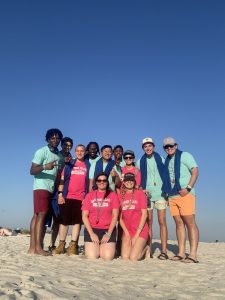
The Research Experience for Undergraduates, or REU, is an undergraduate program focusing on artificial intelligence for hydrologic forecasting. Students learn to apply data science and computer programming skills to research new computational tools for forecasting floods, droughts and water quality. The students in the program can learn from some of the best researchers that the Cooperative Institute for Research to Operations in Hydrology, or CIROH, has to offer.
“I’m hoping to learn from experts in the field and learn to work at an industry standard,” said Quinn Lee, an REU student from The University of Alabama. “So far, I’ve learned a lot of useful skills that I couldn’t have picked up on my own, like the theoretical basis for machine learning and data science and how to use the software often used in industry.”
The REU is a 10-week in-residence program that pays a stipend and offers free on-campus housing. This year, CIROH has nine students from all over the country. It also has students from Costa Rica, Nigeria and Nepal. Even globally, the importance of the program does not go unnoticed.
“I think the REU program is important because it sets you up with necessary research skills you will be taking on in graduate school, and starting that as an undergraduate is huge,” said Troy Marks, an REU student from The University of Florida. “I truly have met so many people within my field of science, from around the country that have taught me invaluable computational, collaborative and core life skills needed to succeed in the scope of a research setting.” Students also participate in “Water Wednesday” activities such as touring the Cahaba River, the West Alabama Food Bank, the WVUA meteorology studios, exploring the Dauphin Island Sea Lab and more.